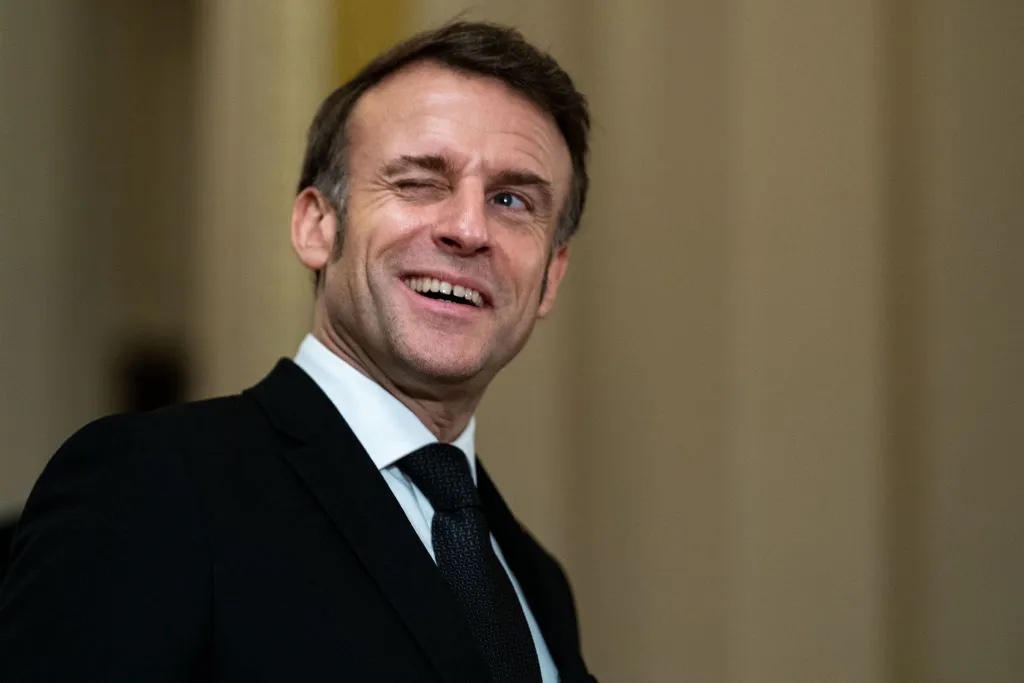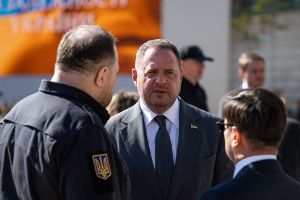It would be a stretch to describe Emmanuel Macron’s meeting with Donald Trump as a “bromance,” but there were plenty of warm handshakes and even warmer words, with the French president at one moment addressing his host as “Dear Donald.” Macron had flown to Washington on Monday to press the case for Europe in the upcoming negotiations between the USA and Russia over the war in Ukraine.
The two presidents had a two-hour virtual meeting with leaders from the G7 along with President Volodymyr Zelensky of Ukraine. Macron and Trump then held a press conference during which the president of France declared that “after speaking with President Trump, I fully believe there is a path forward.”
In public, the pair were in broad agreement. Macron said that Europe and the USA wanted peace, but at the same time “we don’t want an agreement that is weak. This peace must not mean a surrender of Ukraine.”
The only moment of discord was when Trump told reporters that “Europe is loaning the money to Ukraine. They’re getting their money back.” At which point, Macron gently butted in, saying: “No, in fact, to be frank, we paid. We paid 60 percent of the total effort. It was like the US: loans, guarantees, grants.”
Trump toned down his belligerent rhetoric of last week — when he described Zelensky as a “dictator” — and said that the war could be over “within weeks” because he and Vladimir Putin both want a deal. “I do deals,” said Trump. “My whole life is deals. That’s all I know, is deals. And I know when somebody wants to make it and when somebody doesn’t.” Trump said it would be for Europe to bear the cost and the burden of deploying peacekeeping troops in Ukraine.
As Macron left the White House he described the talks as “perfect” but the French president soon got a reality check at the United Nations General Assembly. The US sided with Russia in opposing a European-drafted resolution condemning Moscow’s actions and supporting Ukraine’s territorial integrity. The resolution was passed by ninety-three votes but there were sixty-five abstentions. Among those who joined Russia and the USA in opposing the vote were North Korea, Belarus and Hungary.
The US and Russia then endorsed a US-drafted resolution at the UN Security Council calling for an end to the conflict but omitting any criticism of Russia. The Security Council resolution was passed but Britain and France abstained in the vote after their attempts to alter the wording were vetoed.
Last week in a question and answer session streamed live on social media, Macron had said of Trump: “I respect him and I believe he respects me.” Trump respects France — its history, traditions and culture — and on more than one occasion in Monday’s press conference he referenced his visit to Paris in December to attend the re-opening of Notre-Dame. But does he hold Macron in much esteem? Doubtful, given the mess Macron has made of France since 2017.
At one point in the press conference, Trump was asked by a journalist about a recent Harvard poll that revealed strong support for his actions in his first thirty days in office. Among the poll’s findings were:
- 60 percent of people polled are in favor of direct negotiations between the US and Russia to end the war in Ukraine
- 68 percent agree that the government should recognize only two genders
- 69 percent believe men should not be allowed to compete in women’s sports
- 76 percent support strengthening border security and enforcing stricter immigration policies
- 81 percent support deporting criminal illegal immigrants
Trump explained his strong approval ratings by saying he was elected by the people to “restore common sense to Washington and indeed the world.” He singled out the restoration of control at America’s borders as a particular priority, criticizing the Biden administration for allowing “millions of people pouring through our borders, many of them criminals released from other nations.”
The situation at France’s (and Europe’s) borders remains as chaotic as ever and Macron shows no inclination to bring any “common sense” to his presidency, even though polls repeatedly show that the French are as concerned about border security as Americans.
Among Macron’s entourage in Washington was Jean-Noël Barrot, the minister for Europe and foreign affairs. One wonders if he exchanged words with J.D. Vance at any point. Few Europeans were more furious with the vice-president’s speech in Munich earlier this month than Barrot. After Vance had warned Europe that its greatest foe was “the enemy within” — that of censorship and restriction – Barrot retorted: “We don’t need any lessons in the way we organize our public debate.” On the contrary, said Barrot, it wasn’t Europe that was in peril but America and its values, which “are at stake.”
A few days later, a popular French TV station was closed down, allegedly on the instructions of Macron’s chief of staff who “wants to control broadcasting.”
This helps explains why Macron’s approval ratings are so dismal. A poll published today reveals that 75 percent of respondents consider him a bad president. If Macron doesn’t have the respect of a large majority of his own people, then why should he have it from the president of the United States?


























Leave a Reply